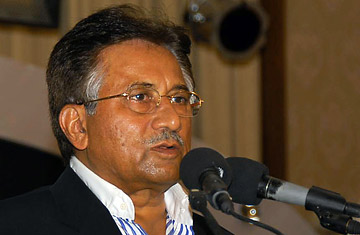
Pakistani President Pervez Musharraf
There can be no doubt that Pervez Musharraf's nearly nine years in power are nearing a close. As the deeply unpopular President's opponents have steadily closed in, some of his key allies have abandoned his side. The powerful army he led for nine years shows no sign of intervening. And even the once guaranteed voice of support from Washington appears to have fallen silent, while the chorus calling for his exit continues to grow louder.
A week after threatening to impeach Musharraf, the four-month-old coalition government was finalizing its "charge sheet" against the President, even as the last of the four provincial legislatures unanimously passed what is in effect a vote of no confidence against the President. The verdict of the legislators of the vast and restive Baluchistan province follows the resolution passed unanimously in Sindh and by over 90% of the votes cast in the other two provinces, Punjab and the North-West Frontier.
Among those who voted against the President were those he had long counted among his allies. Musharraf's former Interior Minister Aftab Ahmed Khan Sherpao switched sides at the last minute after deciding to "support the country's democracy." Said Sherpao: "[Musharraf] is going to fight these charges on a moral ground to try to disprove them. But when it comes to the numbers, I think he's lost it." The coalition now boasts numbers surpassing the two-thirds required for impeachment.
While the provincial votes have no legal implications, they have fortified the pressure on Musharraf to step down immediately and avoid a tortuous and potentially humiliating impeachment process. Over recent days, the atmosphere in Islamabad has grown feverish as discreet talks have gotten under way between various parties, lawyers, foreign diplomats and the army. A flurry of reports have appeared, claiming that Musharraf has agreed to resign but only if he can secure a "safe passage" — an agreement that would grant him immunity against prosecution.
But allies who remain close to Musharraf emerged from a meeting at the President's Lodge yesterday to rebuff suggestions that he was poised to step down. Chaudhry Shujaat Hussain, the president of the pro-Musharraf Pakistan Muslim League-Q, said Musharraf was prepared to face his accusers and had enlisted the support of leading lawyers to represent him in the impeachment proceedings. Indeed, in a rare televised address on the occasion of the 61st anniversary of Pakistan's independence, Musharraf betrayed no intent to resign. Instead he urged a return to "political stability" through an approach of "reconciliation, not confrontation."
Musharraf has appointed Abdul Hafeez Pirzada, one of Pakistan's leading lawyers and a former politician, as his lead counsel. In an interview, Pirzada said he was preparing a "robust defense" while Musharraf weighed his options. Said Pirzada: "They don't know what they are getting into. They have pushed him into a corner. Maybe before, he might have thought about stepping down, but not now." He added that Musharraf feels he needs to respond to the allegations leveled against him and that he still has something to offer Pakistan by remaining its President. "I think he feels that his replacement at this stage would compromise Pakistan."
The move to oust Musharraf comes at a difficult time for Pakistanis. The economy is approaching a meltdown, with inflation at 25% and the rupee falling to a record low against the dollar. There is also concern that the longer the controversy over Musharraf's fate goes on, the greater distraction it will prove from the challenges of Islamist militancy. That threat was underscored 10 days ago when fighting broke out in the Bajaur tribal agency along the Afghan border. Pakistani military jets and helicopter gunships have been targeting an estimated 3,000 armed militants in the area. More that 460 militants and 22 troops have been killed in the operation.
In the meantime, senior U.S. and British diplomats have met with both Musharraf and leaders of the coalition government. Neither Washington nor London — who have long valued Musharraf as a key ally in the "war on terror" — would like to see the already enfeebled President suffer the indignity of impeachment proceedings. The same holds true for the army. "Negotiations are going on between the coalition and the army for a safe exit to be given to Musharraf," said former general Talat Masood. "I think the Americans and the army are demanding he be given safe passage. For the army, impeachment would mean a huge distraction from the war on terror and may even be seen as the army being impeached."
A senior official from the late Benazir Bhutto's Pakistan People's Party said the coalition was prepared to hand Musharraf a deal. "We've said he can have what he wants — his house, his security," said the official, who has been negotiating with the Musharraf camp. Former Prime Minister Nawaz Sharif, the junior coalition partner, had earlier dismissed all talk of a "safe passage" but now appears to be considering the proposal.
If Musharraf manages to secure a deal, many believe he should take it without hesitation. "The time has come for the military leadership to go and have a quiet word with Mr. Musharraf," wrote political analyst Shafqat Mahmood in an op-ed column in the News. "If the price for his quick departure is a safe passage, it should be given. The nation must now move on."
